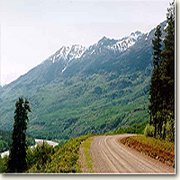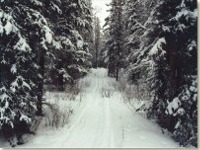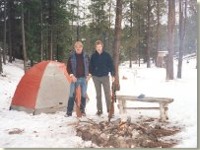Hypothermia!
 I have had hypothermia a number of times in extreme circumstances and conditions, but the experience that stands out the most in my mind is a hiking/hunting trip I took some years ago with my oldest son Dean, when we went to a very remote area of northwestern British Columbia for a ten day hunt.
I have had hypothermia a number of times in extreme circumstances and conditions, but the experience that stands out the most in my mind is a hiking/hunting trip I took some years ago with my oldest son Dean, when we went to a very remote area of northwestern British Columbia for a ten day hunt.
I love getting close to nature and enjoy hiking alone, or with my sons, going from one destination to another, mostly living off the land. On this particular trip I planned to go with Dean to the small native village of Telegraph Creek, then charter a floatplane to fly us into a remote lake, where we would stow a large tent, dry clothes and some emergency rations and then continue to fly over the mountains to a tiny lake some 30 miles away. Our plan was to walk with backpacks from here back to the base camp. However, I had left it very late in the year and the weather was already "chancy".
We drove to Telegraph Creek, rented a "Beaver" floatplane and took off. On the way to the lake the pilot told us there were two things about our destination that we should be made aware of: one, there was a large pack of wolves in the area there and two, a mad trapper could also be in that valley. (The police were looking for him because they believe he had killed some people.) Regardless, we flew into the large lake, dropped our supplies in a small clump of trees, as planned, then continued on to the small mountain lake. It was so small that the pilot could only take off from it by himself, with no passengers or extra weight. We were dropped off here with only light packs and basic staples like salt, sugar, tea and other miscellaneous items because we had planned to live off the land for the whole ten days. Fish, wild fowl and berries were to be our main diet.
After waving goodbye to the pilot, we sat down on our packsacks and just stared, in silence, at the unbelievable beauty of this remote area. Rugged, snowcapped mountain peaks surrounded us and ice-cold mountains creeks emptied into this small crystal clear lake where we sat. Lush green mountain meadows with wild flowers stretched as far as the eye could see.
However, as I looked up at these mountains I saw storm clouds moving in. We quickly set up our small all-weather tent and no sooner were we finished than the storm hit. It was a dandy—and with the howling winds came the snow. The storm became so fierce that we had to cut some small trees and shrubs to construct a wind barrier.
We spent three days in our tent waiting for the storm to pass. For three days I read a pocket book, and because it was the only thing we had to read, I would tear out each page after I read it and pass it to Dean for him to read. He was a faster reader than me so he was always impatiently waiting for the next page.
When the storm subsided we climbed out of our tent and found that what was once rolling fields of mountain flowers was now a two foot deep expanse of snow. We took off, trudging through the snow without any winter gear, heading for a valley farther down, where there would be less snow and hopefully where we would find some grouse or ptarmigan.
We did manage to get a couple of grouse even though they are very rare so high in the mountains. The ptarmigan were next to impossible to find—they are white and hard to spot in the snow.
We walked for the next three days, when we totally ran out of food. The only thing we had left to keep us going was "Tang" orange crystals, so every once in a while we would dip a finger into the "Tang" for energy.
Finally we reached the valley floor where there was less snow. Next morning while I was washing my face in the creek and Dean was building a fire, I looked up and saw the biggest pack of wolves I had ever seen in my life. I counted at least 40 wolves. They were standing on the other side of the creek just watching me.
I knew that wolves didn’t attack man, but seeing so many that close and with no tall trees to climb, prompted us to stoke the fire and keep our rifles and axes at the ready. After looking us over for sometime, the wolves sauntered off, stopping a number of times to look back at us.
 Realizing we were getting rather weak and had covered only half the distance to our main emergency camp. I knew we had to find some food fast or we would be in serious trouble. We started actively looking for a moose or caribou. The next afternoon we found moose tracks and started tracking the animal, which again led us out of the valley back into the mountains.
Realizing we were getting rather weak and had covered only half the distance to our main emergency camp. I knew we had to find some food fast or we would be in serious trouble. We started actively looking for a moose or caribou. The next afternoon we found moose tracks and started tracking the animal, which again led us out of the valley back into the mountains.
By mid afternoon I saw a small bull moose at the bottom of a valley. Carefully I took aim at the moose, when all of a sudden I heard a huge roar. I looked to my right and saw a big grizzly coming at us, full speed. All the time I had spent "survival training" with Dean now paid off. I took careful aim and shot the bear; he collapsed and then rolled down the mountain and into a thicket. Meanwhile, Dean shot the moose.
When we checked the status of the moose, he was dead but we could not find the bear anywhere. I then did something that no hunter should ever do – I entered the thicket looking for the bear. With Dean perched on a rock as backup, he had instructions to open fire if the bear got me, but to be sure not to hit me!
I spent an hour in thick brush looking for the bear but was unable to find him. It’s very nerve racking doing this because if the bear had only been wounded, there would have been enough time for only one shot, from 5-10 feet distance. I felt bad that we couldn’t find him, but we had to get ready for night.
Darkness approached and Dean and I were both weak from not having enough to eat for the last six days, so for food, we needed to field dress the moose and get some steaks. However, we were at a high altitude and there was no wood for a fire, so it was either eat raw meat or wait until the next day when we could get to a lower wooded area to cook the meat. We chose to wait one more day!
It was difficult to find a level spot where we could sleep for the night because we were on a steep hillside. Finally, we settled on a mountain goat trail. We put our two sleeping bags down then stuck four hunting knives into the ground on the outside hoping they would help prevent us from rolling down the mountain.
During the night the weather started to warm and the snow started to melt. As I was on the outside the icy water came down the trail and directly into my sleeping bag. I tried to stay warm, but couldn’t, and ended up going into a full state of hypothermia.
The first sign to Dean was when I started singing and talking about senseless things. At that time, Dean, being an experienced bushman, realized what was happening and got me out of my sleeping bag, stripped off my clothes and put me into his sleeping bag, which was completely dry. He hugged me to bring my body temperature up and in about an hour I came to my senses. However, the sleeping bag was "mummy" style, so the whole time Dean had been reviving me, only the lower part of his body had been in the sleeping bag. From the waist up he had been outside the bag, so by then he was desperately cold.
Realizing this, I climbed out of the bag and Dean got his shoulders in. We continued alternating turns in the bag for the rest of the night, all the while keeping our ears open for a wounded grizzly who could possibly be only 100 yards away!
Next morning we deboned the moose, strapped it on our pack boards and headed uphill, on the way to our destination—the base camp in the next valley where our emergency camp had been stowed. It was a tough climb and by mid afternoon we had finished our last packet of "Tang" and still had not eaten anything else.
 We then came to some sheer rock bluffs. We had to decide whether to go around the bluffs, which were well out of our way, or go straight down using a 100 ft. length of rope I carried with me at all times. We figured we didn’t have the energy to go around, so we decided to go down the rock bluffs. I first lowered Dean down to a ledge about 80 ft. below us and then proceeded to lower our packsacks down. Dean untied the first pack and as I lowered the second, the first one fell off the ledge Dean was standing on, and tumbled at least 200 ft. to the bottom. In that pack were our two sleeping bags!
We then came to some sheer rock bluffs. We had to decide whether to go around the bluffs, which were well out of our way, or go straight down using a 100 ft. length of rope I carried with me at all times. We figured we didn’t have the energy to go around, so we decided to go down the rock bluffs. I first lowered Dean down to a ledge about 80 ft. below us and then proceeded to lower our packsacks down. Dean untied the first pack and as I lowered the second, the first one fell off the ledge Dean was standing on, and tumbled at least 200 ft. to the bottom. In that pack were our two sleeping bags!
Using my ropes, hands and feet, I scrambled down to the ledge. We had to retrieve the sleeping bags (without sleeping bags, survival meant sitting around a fire with very little sleep) so Dean proceeded to climb down to get them and I took the packboard with the moose and followed a different route to meet him at the bottom.
For two hours I sat at the bottom waiting. And waiting. It seemed an eternity and my whole world passed before my eyes as I waited and worried. I fired my gun a couple of times but heard no answer. I waited another hour. Just as I was about to head off in search of him, Dean came walking down the trail. He said he had a tough time retrieving the packsacks—they had dropped into the lake!
We were now in big trouble. The temperature was starting to drop, our sleeping bags were saturated and there was poor chance of lighting a fire with only scrub bushes available for wood. We had to make base camp under all circumstances or we could perish, and we knew we would be walking in the dark part of the way.
With great determination we started off at a pace as brisk as our bodies would allow. It was not very long before we came to the first of four creeks. Our only hope was to keep up our pace and walk through the creek, which was chest deep and icy cold. We kept up a steady pace and managed to cross three more freezing glacial creeks, which were either knee or chest deep. If not for the fact that we were walking along the shore of the lake, which was easier walking than going through the bush, we would never have made it.
We got to the point where each step took great determination. We were just so tired and wet we had to talk to each other to cheer ourselves up and keep motivated. It would have been so easy to just stop and sit..… but we knew if we did that we would never get up again.
Well after dark we reached our base camp. Immediately we went to our emergency boxes, got out the charcoal briquettes, lit them and started piling on wood. We had purposely put our emergency camp in a clump of trees where there was a good supply of wood for burning. As soon as the fire was roaring, we pulled out our emergency OP rum kit and each had 2 oz. Next, when our main tent was up and our sleeping bags were drying in front of the fire, we cooked moose steaks, heated two cans of beans over the hot coals and ate our dinner. No gourmet meal ever tasted so good.
While waiting for the pilot to come back to pick us up, we spent the next two days in this spot, fishing, relaxing, eating moose steaks and enjoying nature the way we had originally planned.
At the appointed time our pilot returned and took us back to Telegraph Creek where we reported the grizzly charge to the local game warden. Next, we drove to the local pub, ordered a T-bone steak each and washed it down with a beer or two, all the while knowing that had it not been for a good measure of common sense and experience the outcome of our trip could have been terribly different.
Contact Information: #200 - 313 Sixth Street, New Westminster, BC V3L 3A7 CANADA
Telephone: 604-606-7900 | Email: [email protected]
Copyright © 2012 Niho Land & Cattle Company. All rights reserved. | Privacy Policy | Terms of Use | Webmaster

